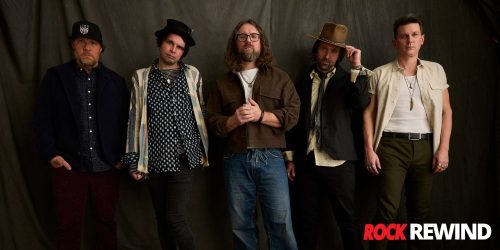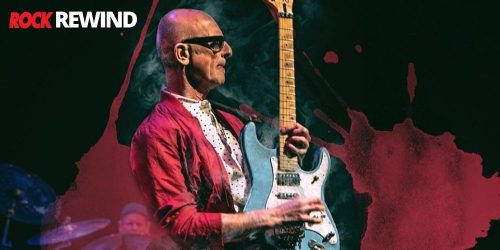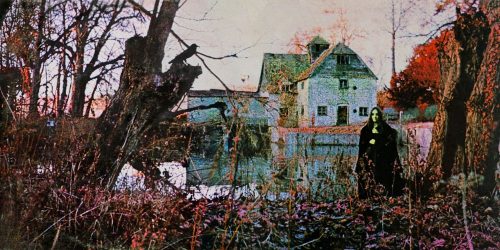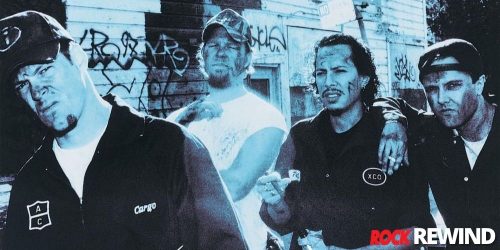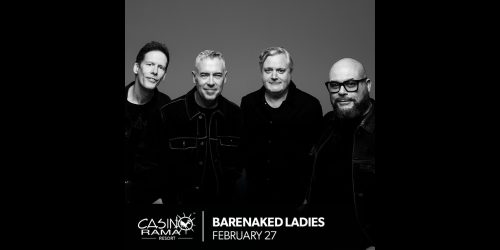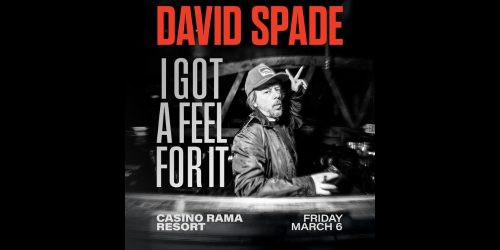Rock Rewind: Nirvana Changed The Face of Alt Rock
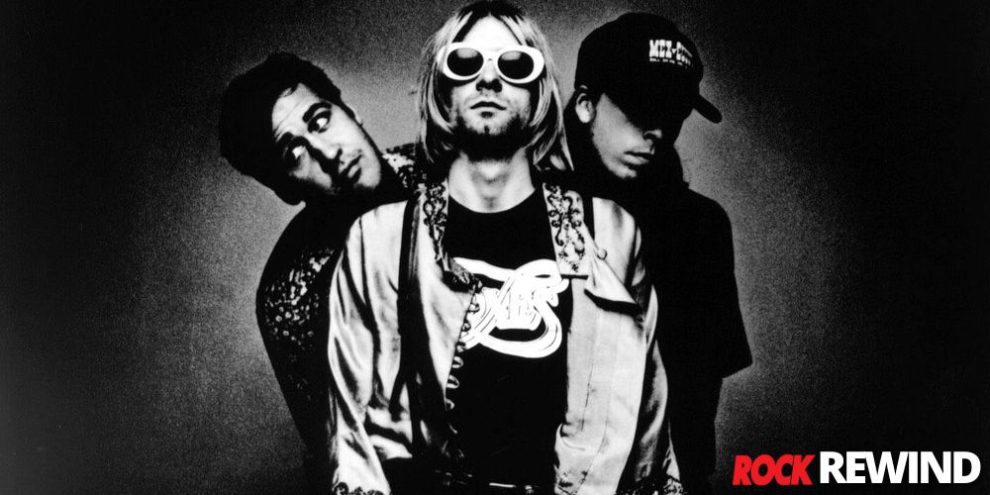
Nirvana's arrival in the early 1990s wasn't a carefully orchestrated studio creation … it was a sonic explosion. Led by the angst-ridden vocals and songwriting of Kurt Cobain, Nirvana ripped through the hair metal complacency of the time with a sound that was raw and real.
Their music resonated with a generation yearning for authenticity, and their meteoric rise, tragic fall, and enduring influence make them one of the most important bands in rock history.
Here’s their story …
Aberdeen: A Breeding Ground for Discontent
Nirvana's story begins in the blue-collar town of Aberdeen, Washington. The old logging town, which was home to Kurt Cobain and bassist Krist Novoselic, never fully recovered from the decline in the timber industry during Cobain’s lifetime. With unemployment rates nearly double that of other towns in Washington, people regularly described the town as an unhappy and unremarkable place.
Cobain, himself, was quoted saying that Aberdeen was “full of bigoted rednecks” and regularly spoke of his unhappy childhood there, where he did not feel accepted. This environment undoubtedly shaped Cobain's worldview, fostering a rebellious spirit and a yearning for escape that would later fuel his songwriting.
Before Nirvana
Kurt Cobain (guitar/vocals) and Krist “Chris” Novoselic (bass) met at Aberdeen High School. Having become friends, Cobain suggested the two start a band. Noveselic was slow to respond but, after listening to a home demo Cobain had created with his previous band Fecal Matter, he eventually agreed.
Their first project together was the Sellouts, a CCR tribute band with Novoselic on guitar and vocals, Cobain on drums and Steve Newman on bass. The band had a handful of rehearsals under their belt when Cobain and Newman got into a physical altercation that involved a vacuum and a 2x4. After the falling out, Cobain and Novoselic brought on Bob McFadden for a new project featuring original music. But again, the band was also short-lived.
Having parted ways with McFadden, Cobain and Novoselic began work on their next project with drummer Aaron Burckhard. This latest band went by many names – Skid Row, Pen Cap Chew, Bliss, and Ted Ed Fred – before settling on Nirvana in 1988. Cobain chose the name because he wanted something “that was kind of beautiful or nice and pretty instead of a mean, raunchy punk name like the Angry Samoans."
Drummers Come and Go
Nirvana’s initial lineup was a revolving door of drummers. By the time the band started recording their first demos as Nirvana, Burckhard had been replaced by Dale Crover of The Melvins. A short time later, Crover moved to San Francisco and was replaced by Dave Foster.
Foster played a few performances with Nirvana before Cobain and Novoselic decided it wasn’t going to work. On May 29, 1988, the pair had written up a letter explaining that Foster was fired.
Dave,
A band needs to practice, in our opinion, at least 5 times a week if the band ever expects to accomplish anything.
We're tired of total uncertainty everytime we play a show, We think … “Are we going to suck”? “Are we tight yet”? We have shows and we don't practice! The two main reasons are, Chris and his work and you and your location. Chris can eventually alter his work schedule and at least practise every week night.
When we started with you, you claimed that you could make it up 4 times a week and would move up here by July or August and it would be no problem for you. We were very hesitant to ever try this because of our experience with driving back and forth to Aberdeen and we knew it would eventually get on your nerves.
We don't blame you at all for being tired of driving and we realize what a problem and hassle it is to get someone else to drive you up, but even if you could make it up everyday we don't start until 8:30 or 9:00, which is not enough time to even go through the set. We know how long it takes to build a house and you won't move up here as soon as you have claimed, and in our morals and values, fixing up a race car isn't half as important as getting to practice or recording or touring.
We also aren’t convinced that you would get time off or quit your job next winter to go on tour. The overall aspect of this situation is nothing more than selfish. Getting a name on a record isn't shit. Anybody can do it, but there’s a big difference between credentials & notoriety, and self respect through music.
Instead of lying to you by saying we're breaking up or letting this go any further we have to admit that we've got another drummer. His name is Chad, he’s from Tacoma and he can make it to practice every night. Most importantly, we can relate to him. Let's face it, you are from a totally different culture.
Our hobbies and interests are different, and a band can’t be a unit unless all the members are compatible. We have really appreciated your loyalty and dedicated attempt at keeping this band alive. You're a great drummer and we hope you pursue another band very soon. We expect you to be totally pissed off and hate our guts and we don't blame you. This is not your fault. It's ours. We should have known that it wouldn't work but your enthusiasm and clear headed thinking made us want to try it. And we feel really shitty that we don't have the guts to tell you in person. But we don’t know how mad you would get.
All the luck to you and Laney and your drumming career. And if you wouldn't mind, we would like to suggest to other bands looking for drummers to check you out because your talent shouldn't go to waste.
Please let us know when it is in your convenience for us to bring your drums and mic down. When you want to discuss this with us call.
Sorry.
Kurt
Chris
But, the letter was never sent. Soon after, Foster spent 2 weeks in jail for assaulting the mayor’s son. In fact, Nirvana never told Foster he was fired, he only found out when he saw an ad for a show they were playing and he didn’t know anything about it.
Chad Channing, who was mentioned in the unsent letter, played his first show with the band in May of 1988.
Nirvana Released Their First Album
Nirvana quickly caught the attention of Sub Pop Records, a Seattle-based independent label that was spearheading the burgeoning grunge scene. Grunge, a term initially used derisively, captured the essence of the Pacific Northwest music scene – a rejection of the polished pop of the 80s in favor of a raw, distorted sound that reflected the angst and disillusionment of a generation.
In November of 1988, Nirvana released their first single, a cover of Shocking Blue’s “Love Buzz,” with Sub Pop. They would also become the first band to sign an extended contract with the label.
Shortly after the release of “Love Buzz”, Nirvana began work on their debut album, Bleach. The recording sessions for the album were paid for by Jason Everman, who was brought on as a second guitarist and listed on the album even though he did not play on it. According to Novoselic, they did this to help him feel more comfortable in the band.
Bleach was released in June of 1989 and was followed up with a national tour. Unfortunately, differences with Everman led the band to cancel the last few shows of the tour.
Along Came Grohl
In early 1990, Nirvana began working on their next album. By this point, things had become tense between the band members. Cobain and Novoselic no longer felt Channing’s drumming was a good fit and Channing was over being excluded from songwriting.
By July, Channing had left the band. Needing a drummer for their American West Coast tour with Sonic Youth, Dale Crover stepped in. Then, in September of 1990, Melvins’ guitarist Buzz Osborne introduced Cobain and Novoselic to Dave Grohl.
According to Novoselic, he and Cobain knew within two minutes that “he was the right drummer.” Looking back at the audition, Grohl recalls, "I remember being in the same room with them and thinking, 'What? That's Nirvana? Are you kidding?' Because on their record cover they looked like psycho lumberjacks... I was like, 'What, that little dude and that big motherfucker? You're kidding me'."
Signing With DGC
Later in 1990, Nirvana decided it was time to move one from Sub Pop. Unfortunately, none of the indie labels could buy them out of their contract so they began looking for a deal with a major label.
Susan Silver, who managed Soundgarden and Alice in Chains, introduced the band to agent Don Muller and Alan Mintz, an attorney for the music industry. Mintz quickly began advocating for the band, sending out demos in hopes of finding them a deal. Later that same year, Nirvana signed onto DGC Record, after repeated recommendations from Sonic Youth guitarist Kim Gordon.
DGC Records, a subsidiary of Geffen Records, was a relatively new label founded in 1990. Unlike established giants, DGC focused on nurturing alternative rock acts. This focus on alternative music made them a perfect fit for Nirvana's sound, which defied mainstream conventions.
The signing with DGC was a pivotal moment for Nirvana. It provided them with the resources and support needed to refine their sound while retaining their signature raw energy. This partnership paved the way for Nevermind, the album that would redefine rock music and etch Nirvana's name in music history.
Getting Back To Their Roots
Since the success of Nevermind, Cobain grappled with the weight of fame. He was thrust into the role of reluctant spokesperson for a generation, a title he never sought. Songs like "I Hate Myself and Want to Die" became a lightning rod for critics who saw Nirvana's music as glorifying negativity. Cobain, however, countered that the song was a reflection of teenage depression, a topic rarely addressed in mainstream music at the time.
He felt that much of he and Nirvana’s spotlight was a result of people misinterpreting their work and he resented fake fans who refused to truly understand the band’s viewpoints. He was pro-choice, stood against sexual assault, and were opponents of sexism, racism, homophobia and more.
That’s why, for the release of their third and final album, In Utero, Nirvana attempted to go back to their roots. Even though some tracks, including “Rape Me,” were wrought with controversy, In Utero, became both critically acclaimed and commercially successful, debuting at No. 1 on the Billboard 200 chart. It also hinted at the turmoil within the band as Cobain's heroin addiction became increasingly apparent, and the pressures of fame weighed heavily on him.
The Final Verse: Cobain’s Struggle
Cobain started using drugs early in life. At 13, he was smoking pot and by the time he was an adult, he had moved onto LSD, solvent abuse, oxycodone, heroin and more. By the time he was 23, he had a heroin addiction, which he excused as self-medication for his stomach condition.
In early 1994, the band went on tour in Europe. Having finished their March 1 show in Munich, Germany, Cobain was diagnosed with bronchitis and severe laryngitis. He flew to Rome for medical treatment, where he was joined by his wife, Courtney Love, on March 3. On March 4, Courtney found Cobain unconscious in their hotel room. The rock star was rushed to hospital, where it was determined he had overdosed on champagne and Rohypnol. Courtney has said in past interviews that this was his first suicide attempt.
Cobain was released 5 days later and he and Courtney returned to Seattle. On March 18, Cobain locked himself in a room with a gun. Police were called and several guns and a bottle of pills were confiscated. Cobain told police that he wasn’t suicidal and said that he was hiding from Courtney.
A week later, Courtney held an intervention for her husband with friends and label execs. Cobain responded with anger and again locked himself in a room before agreeing to attend a detox program.
He was at a Los Angeles facility for only a few days before checking out on March 30 and heading back to Seattle without telling anybody. On April 7, the band pulled out of Lollapalooza. Fans speculated that the band was breaking up. A day later, Cobain was found dead at his home in Seattle with a self-inflicted gunshot wound.
Cobain’s death sent shockwaves through the music world and left a gaping hole in the lives of millions of fans. Cobain's legacy, however, remains potent.
Having laid their friend and bandmate to rest, Grohl and Novoselic blazed new trails. Grohl founded the Foo Fighters while Novoselic turned to political activism.
The Seattle Sound
Nirvana's success wasn't a solo act. They were part of a larger movement – the Seattle grunge scene. Bands like Pearl Jam, Soundgarden, and Alice in Chains were all creating music that reflected the disillusionment and angst of their generation.
Nirvana's mainstream breakthrough opened the door for these bands, bringing grunge to a global audience.
Grunge's impact on music was profound. It shattered the dominance of hair metal and ushered in a new era of alternative rock. Grunge bands weren't afraid to tackle difficult subjects, and their music often had a raw, emotional honesty that was lacking in mainstream music of the time.
While grunge's commercial peak was relatively short-lived, its influence continues to be felt today. Countless alternative rock bands cite Nirvana and other grunge bands as major influences.
Grunge's legacy is a reminder that sometimes the most powerful music comes from a place of frustration and anger, and that even the most commercially successful acts can retain their artistic integrity.
Beyond the Music: Cultural Impact and Legacy
Nirvana's impact transcended mere music.
They became the voice of a generation disillusioned with the manufactured pop of the 80s and yearning for authenticity. Cobain's lyrics, filled with angst and vulnerability, resonated with teenagers grappling with their own sense of alienation.
Their music wasn't just entertainment … it was a soundtrack for life.
They redefined what rock and roll could look and sound like, and their influence continues to be felt today. While their time in the spotlight was tragically short-lived, Nirvana's legacy as one of the most important and influential bands in rock history is secure.
In 2014, Nirvana was inducted into the Rock and Roll Hall of Fame, a testament to their enduring influence. Their music continues to be re-released and re-interpreted, finding new meaning for new audiences.
Nirvana's story is a cautionary tale of the pressures of fame and the destructive power of addiction, but it's also a testament to the power of music to connect with people on a deep emotional level.
Their music, raw, honest, and filled with emotion, captured a moment in time and continues to resonate decades later.
Nirvana Discography
Since 1989, Nirvana has put out:
5 live albums – MTV Unplugged in New York (1994), From the Muddy Banks of the Wishkah (1996), Live at Reading (2009), Live at the Paramount (2019), and Live and Loud (2019)
4 compilation albums – Incesticide (1992), Nirvana (2002), Silver: The Best of the Box (2005), and Icon (2010)
3 boxed sets – Singles (1995), With the Lights Out (2004), and Nevermind: The Singles (2011)
7 video albums – Live! Tonight! Sold Out! (1994), With the Lights Out (2004), Classic Albums: Nirvana - Nevermind (2005), MTV Unplugged in New York (2007), Live at Reading (2009), Live at the Paramount (2011), and Live and Loud (2013)
They’ve also released 3 studio albums …
1. Bleach (1989)
Nirvana's debut album, Bleach, released in 1989, might not have had the explosive commercial success of its follow-up, Nevermind, but it holds a special place in the hearts of grunge aficionados and Nirvana fans alike.
When Bleach arrived on the scene, it encapsulated the burgeoning grunge movement in Seattle. Recorded with producer Jack Endino, the album features distorted guitars, pummeling drums (courtesy of drummer Dale Crover and Chad Channing), and frontman Kurt Cobain's signature vocals – a blend of melody and manic aggression. While Jason Everman was credited with guitar on the album, he never actually played on any of the songs. He was added by the band after offering to pay the recording fees.
Unlike the more polished sound of Nevermind, Bleach is a lo-fi masterpiece. Tracks like "Blew" and "Negative Creep" are short bursts of punk-infused energy, while songs like "About a Girl" showcase Cobain's knack for crafting catchy melodies amidst the distortion. The album also features a scorching cover of Shocking Blue's "Love Buzz," a testament to Nirvana's early influences.
While Bleach itself wasn't a mainstream hit, it laid the foundation for Nirvana's future success. Tracks like "School" and "Paper Cuts" became staples of their live shows, and the album garnered critical acclaim within the underground music scene. Bleach's raw energy and unflinching portrayal of teenage angst resonated with a generation, paving the way for the explosion of grunge in the early 1990s.
Although the album was not overly promoted (something that upset Cobain), it quickly got attention with college radio stations and sold 40,000 copies.
Today, Bleach remains a cornerstone of Nirvana's discography. It's a document of a band finding its voice … a band on the cusp of greatness.
2. Nevermind (1991)
Released in 1991, Nevermind exploded onto the music scene with the iconic opening riff of "Smells Like Teen Spirit." The song, with its deceptively catchy melody, powerful drumming style of Dave Grohl, and lyrics about teenage apathy, became an anthem for a generation. The accompanying music video, featuring a chaotic high school assembly interspersed with surreal imagery, perfectly captured the band's rebellious spirit and propelled them into the mainstream and popularizing alternative rock.
But Nevermind wasn't a one-hit wonder. Tracks like "Come as You Are," "Lithium," and "In Bloom" showcased Cobain's songwriting prowess, blending catchy melodies with introspective lyrics that tackled themes of alienation, frustration, and teenage angst. The album wasn't afraid to delve into darker territory either, with songs like "Polly" confronting difficult subjects.
Originally, the record label hoped to sell 250,000 copies of Nevermind. But commercially, Nevermind was a juggernaut. By Christmas of 1991, the album was selling 400,000 copies a week and toppling Michael Jackson's Dangerous to become the best-selling album of 1991. Today, the album has sold more than $30 million copies worldwide.
Critics lauded the album, with Billboard calling Nirvana “a rare band that has everything: critical acclaim, industry respect, pop radio appeal, and a rock-solid college/alternative base." Nirvana won the 1992 Grammy Award for Best Alternative Music Performance for "Smells Like Teen Spirit," a recognition that both surprised and frustrated the band.
But while everyone was loving what the band had produced, Nirvana was left unsatisfied. They felt the final mix on Nevermind was too polished and too mainstream.
3. In Utero (1993)
Released in 1993, Nirvana's In Utero was a defiant response to the mainstream success of their previous album, Nevermind. Seeking a return to their underground roots, Nirvana enlisted producer Steve Albini, known for his lo-fi aesthetic.
Gone was the polished sheen of Nevermind. In Utero was a return to Nirvana's raw, abrasive roots.
Throughout the album, Kurt Cobain's songwriting remained potent. His lyrics continued to grapple with personal struggles and societal issues. The opening track, "Serve the Servants," was a blistering assault on conformity, while "Heart-Shaped Box" grappled with fame and addiction, its lyrics a cryptic reflection of Cobain's inner turmoil. The album also showcased Cobain's softer side. Tracks like "All Apologies" and "Dumb" hinted at a yearning for connection and vulnerability beneath the layers of angst.
In Utero wasn't without controversy. "Rape Me," with its disturbing screams, created controversy before it’s official release with some feeling it normalized rape. But the track was actually an anti-rape song that hinted at the intrusiveness of the media in Nirvana’s life following the release of Nevermind.
Despite its challenging nature, In Utero was still a commercial and critical success, selling 15 million copies worldwide.
6 months after the album’s release, Nirvana disbanded following the passing of Kurt Cobain. His tragic death may have ended Nirvana's story, but their legacy lives on.
They were a band that redefined rock and roll, a band that screamed into the mainstream and forever changed the landscape of music. Their music continues to inspire new generations of musicians and fans, a testament to the enduring power of frustration, raw emotion, and the unyielding human spirit.
Snag Our Newsletter
Hit that button like you’re pressing play on your favourite track. get exclusive content, stories, and news.

